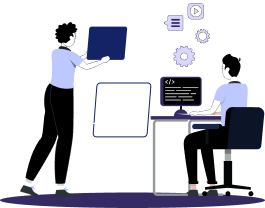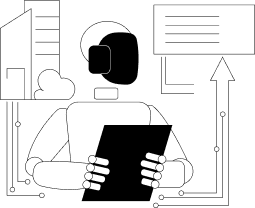- Understanding AI in Smart Construction
- Use Cases and Applications of Artificial Intelligence in Construction Management
- Planning and Designing
- Measuring Site Progress
- Robust Fleet Management
- Risk Mitigation
- Alleviate Labor Shortage
- Predictive Analytics
- How Can AI Boost Smart Construction?
- Improves Productivity of JobSites
- Enhances Project Design
- Collects and Analyzes Data
- Performs Land Survey Efficiently
- Automates Project Management
- Future of AI in Construction Industry
- How Appinventiv Can Help You Leverage AI in Construction
- FAQs
- Q. What is AI in construction?
- Q. What are some examples of AI in construction?
- Q. How to use AI in construction industry?
- Q. What are the challenges of implementing AI in construction businesses?
Want to know how AI is revolutionizing construction? This blog explores AI’s transformative impact on the industry in every phase, from planning to operations. Understand how AI technologies like predictive analytics and RPA streamline project management and design. Also, know why adopting these innovations is essential for businesses to stay competitive.
The world has been captivated by the power of AI technologies like ChatGPT and digital assistants such as Siri, Alexa, and more. AI has a transformative effect on the global industry. And one industry that can immensely benefit from AI adoption is construction, as it is one of the least digitalized sectors in the world. AI in construction can help businesses drive efficiency, enhance quality, improve performance, and straighten safety on sites.
According to a report by McKinsey, the construction industry is worth more than $10 trillion a year, equivalent to 13% of the world’s GDP. And just by digitization, the artificial intelligence in construction market can contribute to raising market capitalization by $1.6 trillion annually. This makes construction one of the largest industries in the global economy.
Tap into this growing market potential with Appinventiv
Understanding AI in Smart Construction
AI and machine learning technologies are revolutionizing every stage of construction, from design to operations and asset management. This technological advancement is bringing about significant improvements in terms of time and cost-effectiveness, particularly in the planning and designing sub-segment.
Artificial intelligence in construction management helps enhance operations’ safety, speed, accuracy, and efficiency. With AI construction solutions, companies can proactively monitor job sites for potential hazards and address critical issues to prevent accidents. ML in construction can analyze the vast amount of data to optimize designs for energy efficiency and cost savings. Robotics process automation (RPA) can improve construction speed and quality.
In simple terms, Artificial intelligence in the construction industry is revolutionizing the way businesses design, execute and manage projects. And as the use of AI continues to expand, it turns increasingly essential for companies to adapt to this emerging technology.
The European market is expected to lead AI adoption in construction, driving growth in the global construction industry. By embracing digitization, all stakeholders, including contractors, owners, and service providers, can benefit from this technological shift. As the industry is still in its early stages of adopting AI, companies that embrace and upgrade their technology stand to gain a competitive advantage.
The use of generative AI in construction industry is bringing massive transformations by empowering architects and engineers to explore a wide range of innovative design possibilities. By analyzing extensive datasets, generative AI algorithms can produce multiple design alternatives, each optimized for efficiency, sustainability, and cost-effectiveness.
This technology speeds up the design process while enabling more creative and precise solutions, significantly improving the quality and outcome of construction projects.
Let’s discover some significant use cases and benefits of AI in construction, which will change how businesses design and develop projects.
You may like reading: How to adopt artificial intelligence in your business – A complete guide
Use Cases and Applications of Artificial Intelligence in Construction Management
Construction and AI go hand in hand. The technology is a critical component to revolutionizing the construction industry by addressing critical challenges like cost, safety, and overruns. You can leverage AI for construction projects, all the way from inception, design, bidding, financing, transportation, and operation to asset management. This helps achieve unprecedented levels of accuracy and efficiency.
For instance, AI-powered quality control systems help identify defects early, predictive maintenance minimizes equipment downtime, and supply chain optimization ensures timely delivery of materials. These use cases and examples of AI in construction management highlight the transformative impact of the technology to streamline processes and enhance project outcomes. Let’s dive in to explore the various applications of AI in construction:
[Also Read: How Much Does It Cost to Build a White-label Construction Bidding Software]

Planning and Designing
AI-based Building Information Modeling (BIM) process has been helping architecture, engineering, and construction professionals make 3D models to efficiently plan, design, build, and repair the buildings and infrastructures.
Also Read: How to Develop a Building Information Modeling Software? All You Need to Know
With ML in construction, the industry uses AI-powered generative design to identify and collaborate with architects, engineers, mechanics, electricians, and plumbers to ensure there are no clashes within the sub-teams. Such measures mitigate the risk of rework.
AI and machine learning in construction explores all the options and variations of the solutions to create design alternatives. Models with multiple variations are created and enhanced with each iteration. This iterative approach continues until an optimal model is achieved, ensuring the creation of a flawless design.
Measuring Site Progress
Construction companies can use AI-powered robots equipped with cameras to capture 3D pictures at construction sites.
With the help of neural networks, these pictures can be cross-checked with reference to the information from BIM and the bill of materials. The engineers managing large projects utilize this information to keep track of the progress. It also helps identify quality errors at an early stage while keeping a tab on financial information and time schedules.
It will not be an exaggeration to say that robotics and AI in the construction industry ensure the delivery of the best construction projects while saving costs and time.
Robust Fleet Management
Construction companies are exploiting the features of the Internet of Things (IoT) to manage fleets of equipment and vehicles. By leveraging construction AI-driven metrics, IoT enables real-time location tracking, predictive maintenance, fuel and battery monitoring, and more. With the integration of IoT-powered solutions, construction businesses can efficiently predict equipment breakdowns and address issues, resulting in significant time and cost savings.
[Also Read: Smart Railways – How IoT is Transforming Train Travel and Operations]
Risk Mitigation
Every construction site is prone to some kinds of risk, such as safety hazards, quality issues, delays, and cost overruns. The bigger the project, the higher chances of risk involved, as there are multiple sub-contractors working parallel on job sites. By leveraging ML and AI construction solutions, general contractors can monitor and mitigate risk instances on the job site, allowing the project team to focus on their core functions.
AI algorithms automatically prioritize issues based on unsafe scaffolding, waterlogging, and personnel lacking essential protective equipment like gloves, helmets, and safety glasses. AI in construction safety empowers contractors to prioritize projects based on risk rankings and proactively address potential safety concerns.
Alleviate Labor Shortage
There is always a dearth of labor in the construction industry as it involves risks and is also a physically demanding job. The average turnover rate in the construction field is way more than in any other industry.
In such a scenario, AI-powered robots empower project managers to oversee the real-time situation and resource requirements of multiple job sites. Based on the requirements, labor can be shifted to a different part of the project or a different job site. The robots monitor the site to find the pain areas.
For instance, an AI-powered robot, Spot the Dog, conducts nightly scans of job sites to monitor progress. It allows contractors to increase productivity, particularly in remote areas with limited availability of skilled labor.
Predictive Analytics
AI algorithms can analyze vast amounts of data collected from sensors, IoT devices, and historical project data to provide predictive analytics. It enables construction companies to anticipate potential issues and take proactive actions before a problem occurs that may interrupt work. It leads to improved project planning, workers’ safety, and decision-making.
As per a McKinsey report, implementing predictive maintenance strategies can reduce machine downtime by 30-50% and increase its lifespan by 20-40%.
How Can AI Boost Smart Construction?
Companies that want to stay ahead in this competitive age should quickly upgrade their infrastructure and leverage AI technologies to redefine their operational strategies. Let’s explore the multifarious benefits of AI in construction businesses.

Improves Productivity of JobSites
Construction companies use self-driving machinery to automate repetitive tasks, such as pouring concrete, welding, bricklaying, and demolition. Similarly, they can use autonomous or semi-autonomous bulldozers to excavate and prep work. Once the exact specifications are fed into these machines, they complete the job exactly as per the specifications, freeing up the human workforce for actual construction work.The combination of AI and construction automation reduces time and the human risks involved in performing these tasks. Also, project managers can leverage AI technologies like facial recognition, onsite cameras, and more to assess worker productivity and track job site work in real-time.
Enhances Project Design
Using ai in construction can significantly enhance project design. By analyzing vast amounts of design data, AI algorithms can identify patterns, optimize layouts, and suggest design improvements. It helps architects, engineers, and designers streamline the design process, improve efficiency, and create more innovative and optimized structures.
AI-powered design tools can also simulate different scenarios, evaluate structural integrity, and assess energy efficiency, enabling informed decision-making and reducing the risk of design flaws. This integration of generative AI in construction design process leads to more efficient, cost-effective, and sustainable construction projects.
Collects and Analyzes Data
AI construction solutions such as camera-enabled robots, autonomous equipment, etc., collect data in different formats. By inputting these details into a deep neural network, the system can automatically classify the project’s progress from multiple perspectives. This data enables management to identify and address even the slightest errors or issues in the early stages, mitigating the occurrence of major problems later on.
Performs Land Survey Efficiently
You can dramatically reduce the time surveying the land in detail and taking aerial photos of the job site for better project management. With the help of drones, Geospatial Information Systems (GIS), and Geospatial AI (GeoAI), you can keep track of project progress and problems on the construction site.
You may like reading: How is Drones Technology changing the construction space?
Automates Project Management
Completing construction manually can be tedious, time-consuming, and susceptible to errors. The project manager often finds themselves occupied in assigning work and managing employee records.
Artificial intelligence in construction project management can efficiently automate these mundane tasks, minimizing errors and freeing up valuable time and resources. AI automation can delegate tasks based on employee data, optimizing the workflow and enabling workers to concentrate on their specialized areas, enhancing overall productivity.
[Also Read: How to Streamline Your Real Estate Business With Construction Project Management Software]
Take a look around our work portfolio and drop us a line; we’d love to chat.
Future of AI in Construction Industry
The future of AI in construction promises a transformative shift where cobots and robots work alongside human workers. Robots automate repetitive tasks, while cobots operate autonomously or with minimal guidance. This integration speeds up construction process, saves costs, enhances safety, boosts efficiency, and facilitates smarter decision-making. Furthermore, the use of AI in construction will also revolutionize operational efficiency and redefine business models, minimizing costly errors in building operations. To capitalize on these advancements, construction industry leaders are encouraged to strategically invest in construction AI solutions tailored to their specific needs.
Early adoption of artificial intelligence in construction scheduling and management positions companies to drive growth and gain a competitive advantage. By embracing this digital transformation, business leaders can set the course for future success and maximize the benefits of AI for construction.
Also Read: How Construction ERP Software Development Can Optimize and Streamline Your Business
How Appinventiv Can Help You Leverage AI in Construction
From planning to designing, AI for construction management has been spreading its wings in all its sub-segments. It has immense potential to change many facets of the construction process. So if you are not yet leveraging construction AI, you must consider AI construction outsourcing software development services now. The impact of AI in the construction sector is tremendous.
Harness the power of AI in construction with Appinventiv and take your business to the next level. As a leading AI development company, our team believes in molding their expertise based on our client’s specific requirements, as we have successfully done for our esteemed clients – Vyrb, YouComm, Mudra, and more.
With a team of experienced AI developers in Australia, US, UAE and a deep understanding of the industry, our IT consulting services experts can be your trusted partner to help you harness the potential of AI in construction to revolutionize the business processes.
Being a leading construction software development company, we can deliver tailor-made solutions that optimize project management, enhance operational efficiencies, and improve safety on your construction sites. Our bespoke AI applications streamline workflows, automate repetitive tasks, and provide deep insights into your operations, enabling you to make informed decisions quickly and reduce overall project costs.
Partner with us and embark on a transformative journey toward a smarter and more sustainable future for the construction industry.
FAQs
Q. What is AI in construction?
A. AI in construction helps enhance various aspects of the construction industry. By leveraging the power of machine learning, robots, drones, and other AI-powered solutions, construction companies can efficiently optimize processes, improve safety, increase productivity, automate tasks, and make informed decisions.
Q. What are some examples of AI in construction?
A. Below are some examples of artificial intelligence in construction industry that businesses use to improve workflows.
- Predictive Analytics
- Autonomous Vehicles and Robotics
- Intelligent Monitoring Systems
- Virtual Reality (VR) and Augmented Reality (AR) in construction
- Natural Language Processing (NLP)
Q. How to use AI in construction industry?
A. Generative AI for construction is used to enhance various aspects of the industry. It collects and analyzes data from building projects to optimize energy efficiency, water supply, indoor air quality, and other performance metrics.
Q. What are the challenges of implementing AI in construction businesses?
A. Here are some of the challenges of implementing AI in construction businesses:
- Complexity of implementation
- Data quality and integration
- Resistance to change
- High initial costs
- Scalability issues
- Security concerns
- Regulatory and compliance issues
- Skill gaps
- Lack of standardization
- Dependence on quality data


- In just 2 mins you will get a response
- Your idea is 100% protected by our Non Disclosure Agreement.
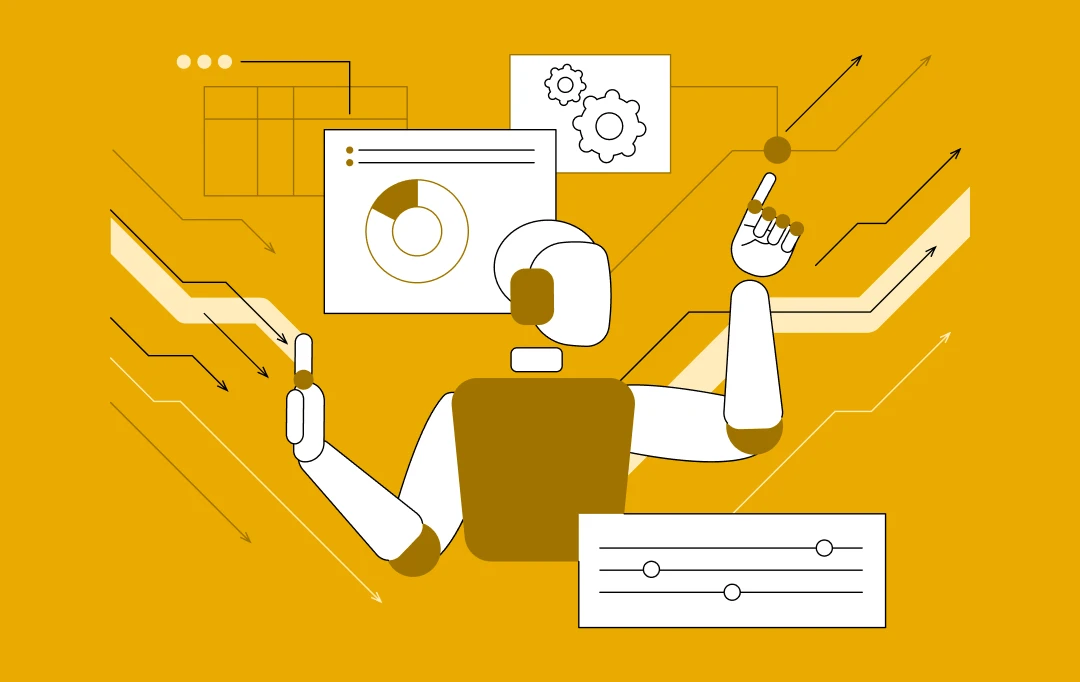
How to Integrate AI with EHR/EMR Systems for Streamlined Healthcare Operations
Key takeaways: Not adopting AI in EHR/EMR today risks falling behind. AI streamlines EHR workflows, cutting clinical and admin delays. Real-world hospitals are already seeing faster, smarter care with AI. Seamless AI integration needs system checks, data prep, and training. AI in EHR tackles real challenges like bias, cost, and compliance. Custom AI integration costs…
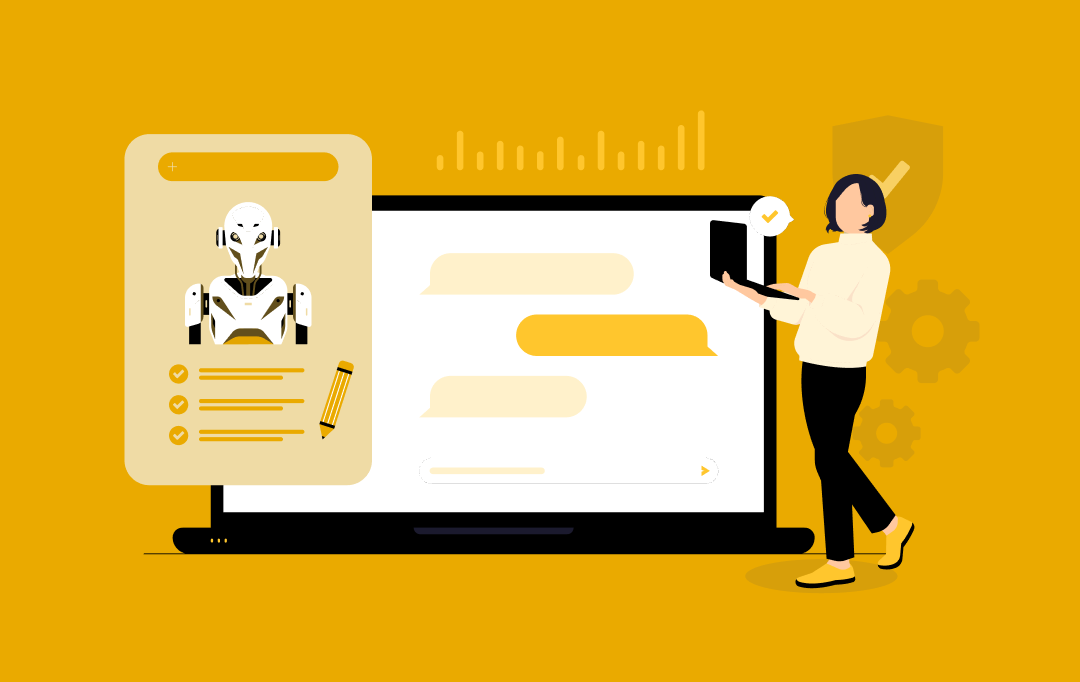
AI Agent-Driven UIs: Replacing App Menus and Buttons
Key takeaways: Challenge: Static menus and buttons also become outdated because people are frustrated by limited, multi-stage navigation. Solution: The AI Agent interacts with the user through a friendly UI that does not require cludgy menus but conversational and context-sensitive navigation. The Way AI Agents Work: AI agents establish a basis of natural language understanding,…
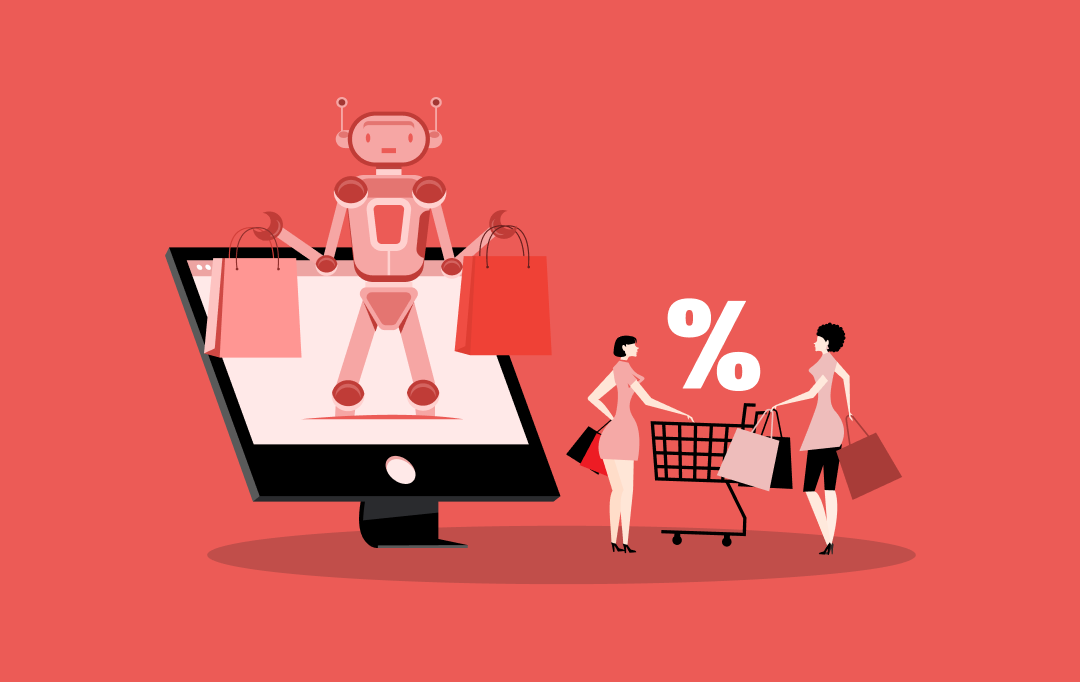
10 Use Cases and Benefits of How AI Agents Are Revolutionizing the Retail Industry
Key takeaways: AI agents in the retail industry are revolutionizing businesses by enhancing customer experience and streamlining operations. From personalized recommendations to predictive analytics, AI offers tangible benefits like increased conversions and reduced costs. AI adoption can lead to scalable growth and a competitive edge in the retail industry. Retailers must consider data strategies, talent…







